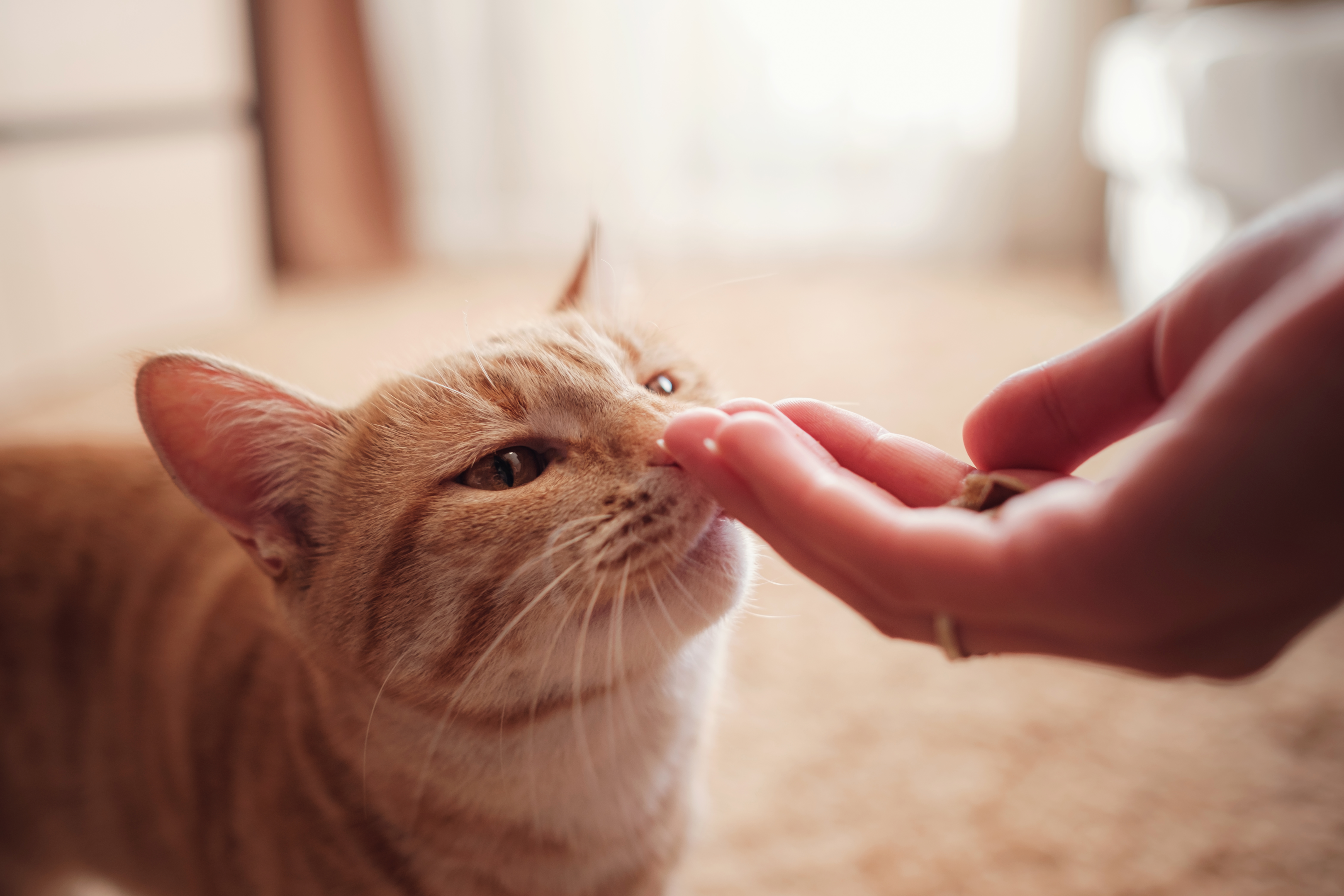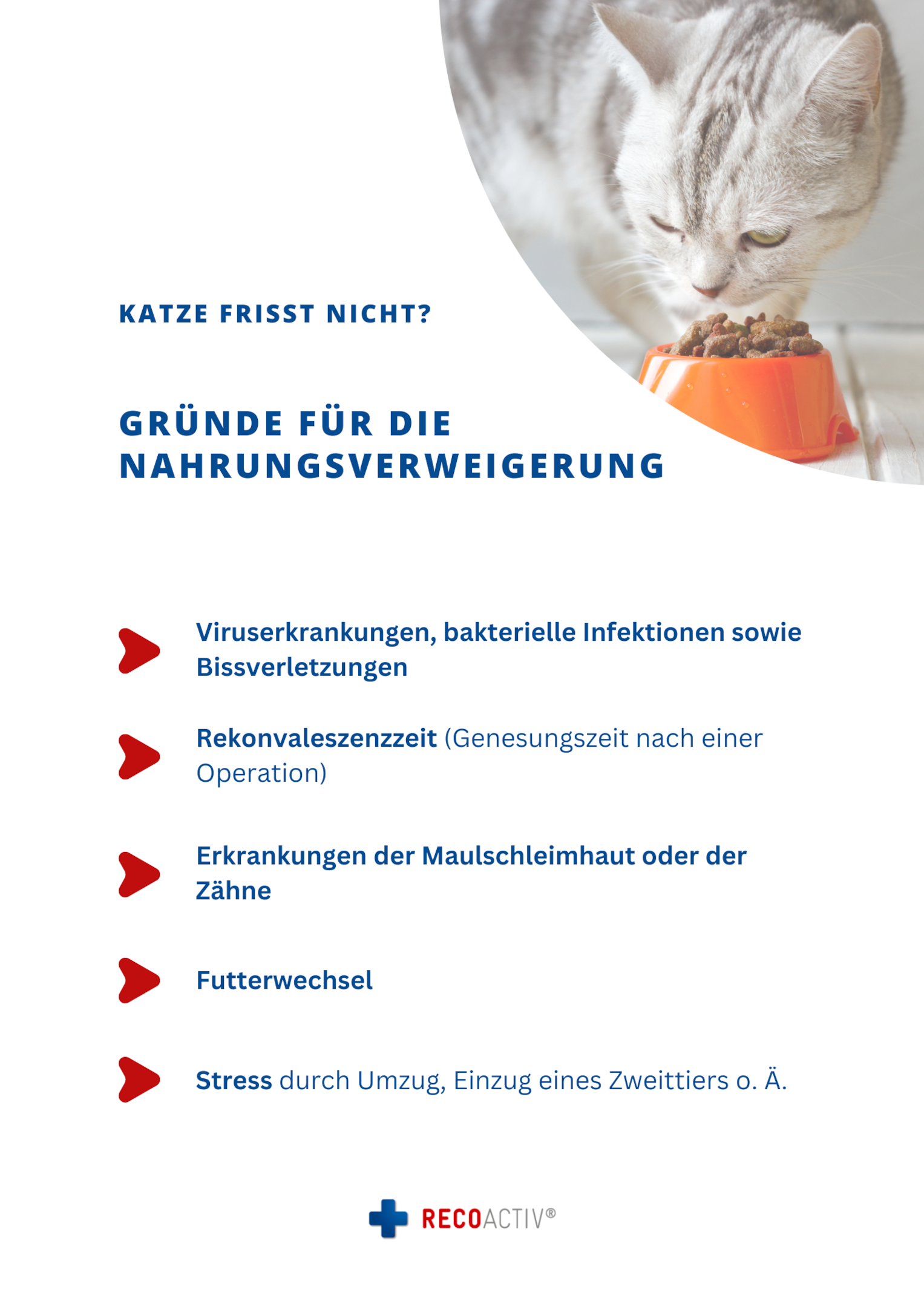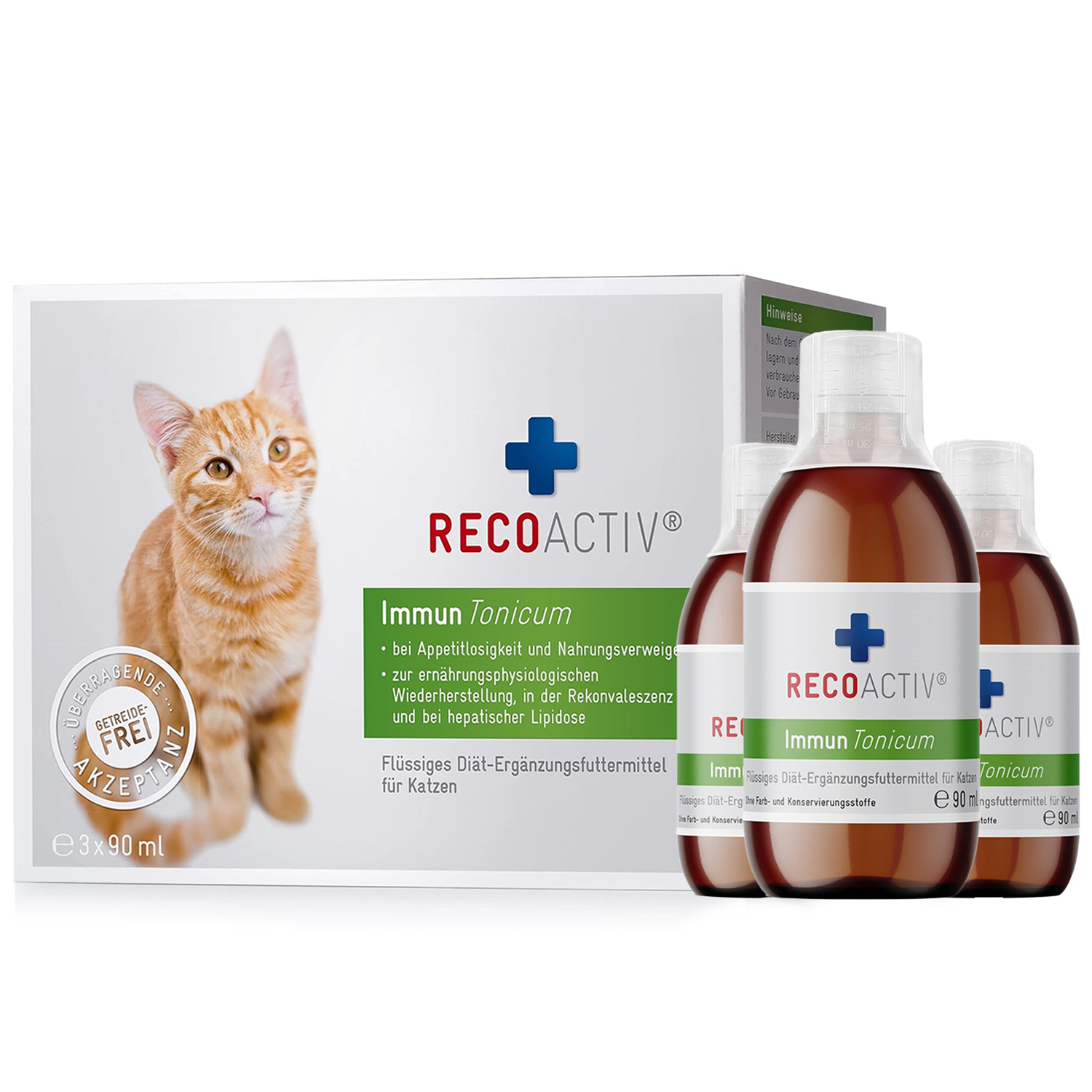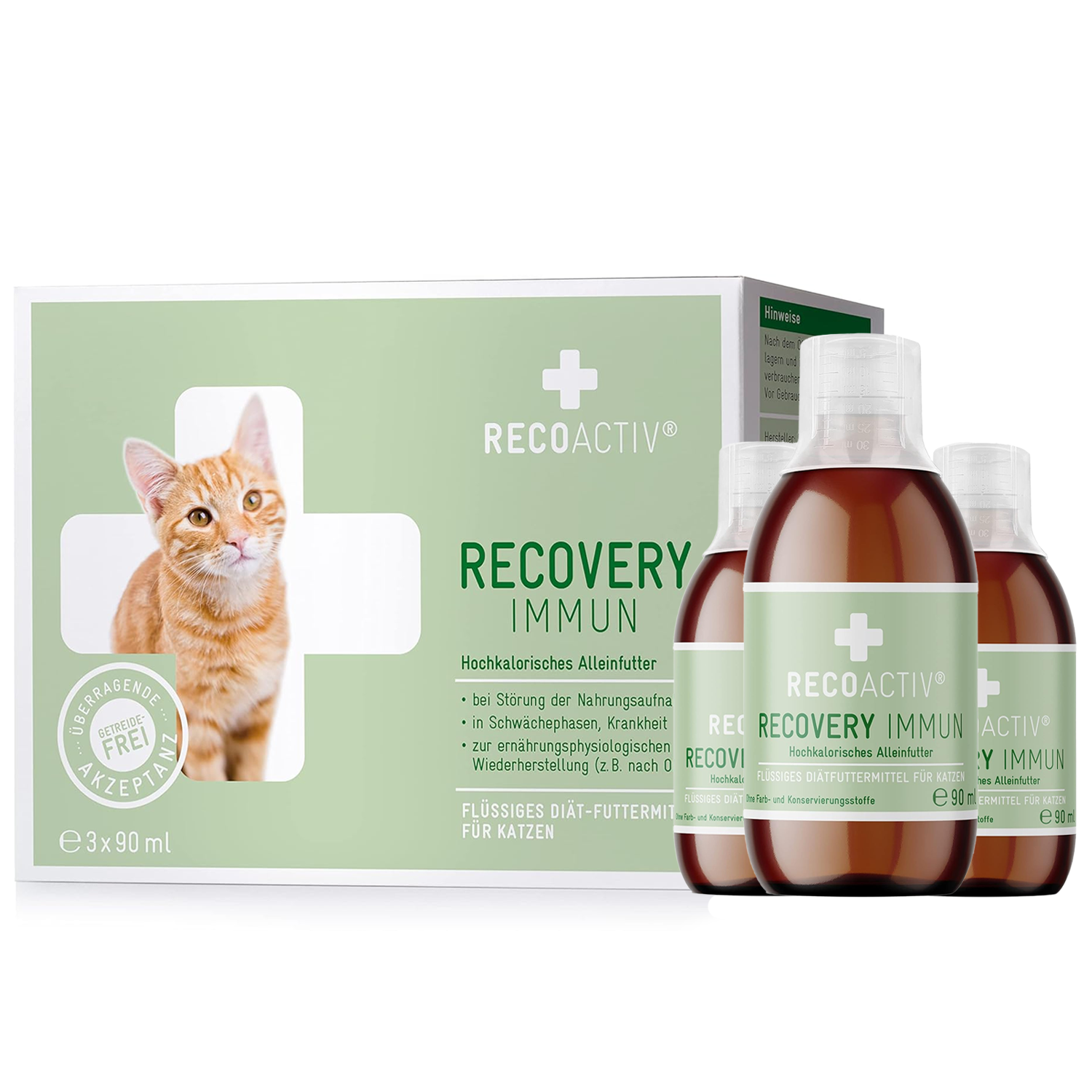If cats don't want to eat, that doesn't always have to be a cause for concern. However, it is important that you observe them carefully. If a cat goes without food for more than 24 hours, it can be harmful to its internal organs. Now we have to get to the bottom of the cause of the refusal to eat:
Is the cat perhaps dissatisfied with the food provided? Does she have pain or abdominal discomfort?
Whether there are serious causes behind the loss of appetite can ultimately only be determined in a veterinary practice. Veterinarians have completely different options and the necessary specialist knowledge to examine animals in detail.
In this article we will look at possible causes of food refusal in cats and explain what you can do.

When cats don't eat
Cats often present their owners with insoluble problems when it comes to feeding because the animals for inexplicable reasons stop eating the food they previously enjoyed . Even if nothing has changed in the cat's lifestyle considering the owner, sometimes there are little things that keep the cat from eating the food.
The reasons for this could possibly be changes in the recipe or the consistency of the food, but also a negative experience in connection with feeding . All of these factors can contribute to cats suddenly stopping eating their usual food.
Many cat owners trust that their pet will eat food again after a short period of time, but the longer the cat refuses to eat, the less likely it is that the animal will return to the food bowl.
Causes of food refusal in cats
The causes of poor feed intake or even refusal to eat can be very diverse:
- Illness accompanied by fever and weakness (bite injuries, viral diseases, bacterial infections)
- Operations and the period of convalescence (recovery)
- Diseases of the oral mucosa or teeth (enamel defects (flor), eosinophilic granuloma complex, gingivitis)
- Feed change
-
Stress (e.g. due to moving home, changing family circumstances, being looked after by strangers, moving in with a second animal)

Cat eats something else
The cat isn't eating ? If the cat is an outdoor cat, the reason for refusing to eat at home can be quite banal: perhaps it has simply eaten its fill somewhere else . This is particularly true if other cats are kept in the neighborhood. Occasionally, it's just too tempting for cats to snack from another cat's bowl. Every now and then, eating in a foreign country tastes better.
It could just as well be that the cat feeds itself with mice and birds and its hunger is then also satisfied. In the cases described, a change in food or a little more variety may make sense.
With indoor cats, it is of course much easier to control what they eat throughout the day. If the cat suddenly refuses its (main) food, you should consider whether it may be receiving too many treats in between . Snacks should never replace a cat's main food because they contain all the important nutrients a cat needs to lead a healthy life.
Something is wrong with the food
If there is something wrong with the cat's food, it will most likely reject it too. These reasons may exist:
- Lack of freshness: Moist cat food can quickly lose its freshness, especially at high temperatures. Cats are sensitive animals and often notice this just by smelling them.
- Unfamiliar, new type of food: The type of food has been changed or the manufacturer has changed the recipe? In this case too, cats often initially react with rejection. If you want to specifically change the food, you should do this slowly and gradually. For example, it makes sense to mix a little new food with the cat's usual food every day. It can then be completely replaced later.
- Spoiled food: It is certainly understandable that a cat will not touch spoiled food. Cats instinctively know that eating them would not be good for them.
- Unusual consistency: Moist cat food can vary in consistency. Some cats prefer pieces, others a creamy food. If the consistency of a food is unfamiliar to the cat, it will probably initially reject it or at least view it suspiciously.
- Oversaturation: The same food every day? This can quickly become boring for cats. It is true that they are creatures of habit and generally do not like strong changes. However, there can be a little variety every now and then. It is not advisable to put the same type of meat in front of your cat every day - it could then get tired of it at some point.
intolerance
Often the reason behind the refusal to eat is a feed intolerance . Like us humans, cats can also react sensitively or even allergically to certain ingredients. In many cases, intolerance to certain protein sources found in cat food occurs. The cat may not tolerate certain types of meat such as beef or poultry ; In addition, intolerance to various types of grain is possible.
If the cat is unable to utilize these, malaise, vomiting and diarrhea often follow. She will then automatically stay away from food because she doesn't want to experience the discomfort again. That's why it's important to find out the reason for the intolerance and stop giving food that contains this protein source.
Cats that generally have sensitive stomachs may benefit from sensitive food . In any case, it is advisable that they be examined at a veterinary practice so that the cause of the intolerance can be determined. Only then is a sensible change in feed possible.
Dental problems
Cats often suffer from dental problems, which also include the gums. Missing teeth, changing teeth, inflammation or tartar can often be identified as the cause of the symptoms. These in turn lead to cats having less of an appetite. If you suspect your cat has a problem with its teeth, you should take it to a veterinarian.
It makes sense to feed additional dry food because chewing can remove tartar from the teeth.
Old
Older cats often have various illnesses such as chronic kidney failure , cardiovascular or liver disease . In all cases, the symptoms usually include a decreasing appetite. For this reason, it is important to have old cats checked by a veterinarian frequently. The earlier a disease is detected, the better it can be counteracted with medication and certain foods .
In older cats, however, sensory abilities such as smell often decline. Then it may be that the cat simply has no appetite because it cannot smell its food.
Organic diseases
But younger cats can also suffer from serious illnesses , which could be a possible reason for refusing to eat. For example, it is conceivable that there is a disease in certain organs .
Veterinarians can use blood, urine and stool samples to rule out various diseases. This is also possible using an ultrasound examination . If additional symptoms such as fatigue, nausea or diarrhea occur, you need to act quickly.
These diseases can cause a cat to suddenly stop eating:
- Inflammation of the stomach or stomach lining as well as inflammation of the intestines or pancreas
- Metabolic disorders such as kidney, gallbladder and liver diseases
- Tumors
Infections
If a cat's immune system is fighting an infection, this is a common cause of refusal to eat. Infections are caused by viruses , bacteria or parasites and are sometimes accompanied by symptoms of a cold or flu. This includes:
- exhaustion
- Fever
- apathy
- strong thirst
- Digestive problems such as stomach pain, vomiting or diarrhea
- impaired sense of taste and smell
- Loss of appetite
- anorexia (wasting weight)
Certain discomfort often occurs in connection with a parasite infestation , for example by worms. This can be a reason why the cat no longer eats properly.
Psychological stress
Cats are generally sensitive animals that sometimes suffer from psychological stress. What the cat perceives as a burden can vary greatly. It is possible that she finds a change in food stressful. But it could just as easily be that the cat is frightened by noisy children or other animals in the household . Cats in heat, pregnant or lactating often eat poorly because their hormones are out of balance.
These living conditions can cause cats to feel stressed or psychologically burdened:
- Visits to the vet or surgeries
- Relocation
- Disorientation in unfamiliar surroundings
- Coexistence and conflicts with other animals
- Mourning for a caregiver or other animal
- Pregnancy and birth
In some cases it even happens that cats associate their food or the feeding place with a negative experience. This may be due to an illness or medication that the cat had to take with food. If such a behavior pattern occurs, a lot of love and patience is required from cat owners. The animal must then be carefully encouraged to eat again.
This works best if you place your food bowl in a quiet place and give the cat loving attention .
Features of cat metabolism
Cats are carnivores (meat eaters) , which means they rely on a diet that almost exclusively contains meat. They need a lot of proteins for their metabolism and, in comparison, a very low proportion of carbohydrates. If too many carbohydrates are consumed in the feed, this can reduce protein digestibility (protein absorption).
The proteins are not only needed to maintain muscle mass and maintain body functions , the blood sugar levels are also regulated with the help of the proteins. As a rule, cats eat many small portions throughout the day (and also overnight) and can easily bridge short periods of hunger .
Hunger metabolism begins after a fast of 3 to 5 days, as a result of which the body tries to synthesize alternative energy sources by releasing fatty acids. However, this is only possible over a short period of time. Especially in overweight cats, a lot of fatty acids are mobilized and accumulate in the liver. This often leads to hepatic lipidosis.
If food refusal occurs, supplementary feeding with a protein-rich food is necessary immediately to ensure the supply of important nutrients.
Treatment options for food refusal in cats
If cats do not eat, wet food or liquid supplementary food is a suitable option for feeding the animals, as it is easier to absorb and requires less effort to eat. If the animal is very weak, the food can be given directly into the mouth using a syringe . If the cat cannot swallow, it is possible to administer high-calorie food through a tube .
This way you can stimulate your appetite
If a cat suddenly eats poorly or no longer eats, you should definitely not ignore this fact. Instead, it is now important to encourage the cat to eat. With our tips you should be able to do this.
Illnesses as possible causes should be ruled out beforehand. If the cat suffers from an illness, it must be treated by a vet immediately!
The cat is healthy but still eats poorly? Then the following tips are advisable:
- Serve treats: Sometimes things that the cat really likes can help. Tuna has a very strong smell and therefore encourages many cats to eat it. It is not absolutely necessary to give her a whole tuna. You can also mix a little of it into regular cat food. Special nutritional supplements can also help stimulate a cat's appetite.
- Heating wet food: Briefly heating the food in the microwave causes it to smell stronger. And a strong, pleasant smell of food is known to awaken a new appetite in cats.
- Moisten dry food: Some cats find it more comfortable to chew the food.
- Small portions several times a day: It is in the nature of cats to eat several portions a day.
- Sprinkle dry food or snacks over wet food: However, you have to keep an eye on the cat's daily needs. If she also receives dry food, it is important to give her less wet food.
The cat still doesn't want to eat? You shouldn't give up right away. Maybe it's the location of the food bowl . Then you can try to put it in another place that might be more comfortable for the cat.
What happens if the cat doesn't eat?
A cat's body is designed to eat small portions several times a day. If a cat lives in the wild, it always has to catch something. Through exercise, the calories contained in food are used as much as possible. Large fat deposits do not form because the fat from the captured animals is metabolized by the cat using the enzymes it contains. However, cats themselves cannot produce these enzymes.
If a cat stops eating, its energy quickly dwindles - as a result, it becomes tired and listless. This also reduces the feeling of hunger, which is a natural protective mechanism in the cat's body. If she went hunting while hungry, she would quickly run out of energy. Missing the prey as a result would ultimately leave them completely exhausted .
Cats cannot store food in their stomachs. For this reason, the body has to fall back on reserves if there is no food. Muscles and fat are burned. If this situation persists for more than 38 hours , there is a disturbance in the balance of fat metabolism and the liver. Stored fats can no longer be excreted and thus flood the liver. A fatty liver can in turn lead to liver failure and, in the worst case, death.
When should I consult a veterinarian?
If a cat has a lot of fat reserves - as is the case with many domestic cats - it is at increased risk . If you completely refuse food, you should never wait longer than 24 hours before visiting the vet.
FAQ
It is understandable that as a cat owner you are worried if your beloved cat suddenly no longer wants to accept food or eats poorly. This also raises various questions, which we will address in more detail in this area.
How long is it OK for a cat not to eat?
Cats that do not eat for more than 24 hours must be examined and treated at a veterinary practice immediately. It is always an emergency.
What to do if the cat refuses food?
If the cat stops eating, you need to act quickly. If the cat is healthy, you can use various tricks to encourage it to eat. A good advice is to slowly switch the food to a different type. You should also check whether it is still good or whether the cat has food intolerances.
How do I get my cat to eat again?
If the cat's diet has been changed from wet food to dry food, it may have difficulty at first. Then you should moisten the dry food for the house tiger. Wet food, on the other hand, can be heated briefly in the microwave to produce a stronger smell.
Conclusion
If a cat stops eating, it is definitely a sign that something is wrong. Then she should be carefully observed. If there are other symptoms in addition to loss of appetite, this may indicate a serious illness. A visit to the vet is then advisable. This also applies if the cat has not eaten anything for more than 24 hours.
If the animal is healthy and the refusal to eat still persists, this should not be ignored either. The causes may then lie in the food itself and a change in diet may be necessary. Outdoor cats also often help themselves to the neighboring cats' food bowls. If there are no apparent causes for a cat's disturbed eating behavior, you can try moving its bowl to a different location. It should be in a quiet place and not right next to the litter box.
In many cases, cats can be encouraged to eat with tasty supplementary food . At Recoactive we offer a variety of high-quality products that are generally very popular with cats.



